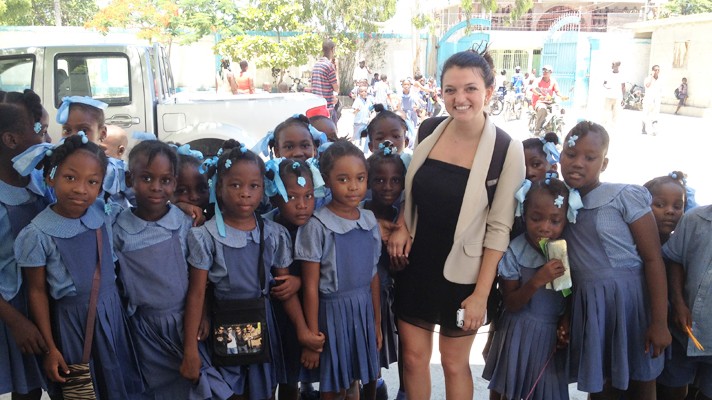
Haiti was already considered the poorest country in the Western hemisphere when the devastating 2010 earthquake killed more than 300,000 people and displaced hundreds of thousands more. It is a challenge for most of the country’s citizens to think much beyond their day-to-day existence and struggles.
In order for the country to recover and move forward, some longer-range thinking is needed, and a group of Yale students are spending their summer in Haiti hoping to inspire Haitian youth to do just that. Already they are reporting seeing new ways of thinking among the young high school students with whom they are working.
The Yale students have just launched Citoyen Haiti, an initiative founded by Yale senior Larissa Liburd to boost the leadership skills of Haitian high school students and inspire them to dedicate themselves to the betterment of their country in the not-so-distant future. About 50 Haitian students are participating in the new program, which is led by Liburd along with her team of seven Yale students and a student from Stanford University, with the support of aides from Quisqueya University in Haiti’s capital city of Port au Prince.
Liburd, who was born in Haiti and lived there until the age of 6, started Citoyen Haiti to help counteract the dearth of young leadership that has resulted in the country because so many talented Haitian youths leave their homeland.
“Like many developing countries, Haiti struggles with the side effects of ‘brain drain,’” Liburd says. “Many students leave the country to attend universities abroad. More often than not, they extend their stays overseas, in the hope of finding better employment opportunities and gaining a different lifestyle. In the minds of many, Haiti is perennially stuck in a poverty trap. As it continues to lose the best and brightest, the government struggles to attract talent — but without the vital human resources necessary to seek out and convince these prodigal students to return. It’s a vicious cycle.”
Citoyen Haiti, she adds, “hopes to capture these young adults before they make plans to ‘escape.’”
The students chosen for the program were recruited from public and private schools throughout Haiti, and all of them have a solid educational background, Liburd says. All speak or understand English well enough to work with the Yale students who serve as teachers. (Volunteer aides from Quisqueya University also help with translation.)
The program takes place over five weeks and is divided into six sectors: Finance and the Economy; Law and Advocacy; Women’s Rights; Public Health; Education and Vocational Training; and Communications and the Arts. During the first week of the program, the students are given an overview of each sector in the context of Haiti as well as other nations in the world. Then the students rank the sectors in order of their interest, and are assigned to one based on their rankings. They spend the remaining weeks learning how to “inspire and spearhead real change” within their respective sector, says Liburd.
“During the ‘TEACH’ period, students get foundational background knowledge within their sector that allows them to make comprehensive and comparative analyses of Haiti versus other places in the world,” Liburd explains. “The ‘OBSERVE’ week is when students are put into contact with speakers and sites relevant to their sector, ranging from government officials to pop stars to media moguls, in order to observe the theory they’ve been taught in action. During ‘STRATEGIZE,’ our students are asked to identify an issue within their sector they believe to be solvable, and then move forward with their newly gleaned research and management skills to develop that solution. Finally, the ‘INSPIRE’ period is when students are asked to present their findings to many of the same notables, as well as government ministers and relevant industry giants, while simultaneously presenting their hopefully tangible solutions as projects in need of funding for actual implementation in Haiti. All of these periods are devised to show the students how easily, efficiently, and quickly they can effect change in their own country.
“We’re hoping to give each of our students not only a foundational education in affecting change, but the confidence, leadership skills, and general ambition necessary to convince them that they will be the ones to move Haiti forward — not the nameless, faceless president of some far-off future. We want to inspire them to be passionate about civic engagement and public service,” she adds.
As Liburd gets the inaugural Citoyen Haiti program off the ground this summer, many of her Haitian family members have lent their assistance and support. The husband of her mother’s cousin is the inspector-general of the Haitian police force; he is visiting with the high school students, and even invited the group to the National Haitian Police gala. Her aunt, a caterer, is providing food for the program, and an uncle has helped with logistical support, such as wifi, electricity, and air conditioning.
“I have a whole system of extended family that has provided us with everything from the house we are staying in to the security and the transportation company we use,” says Liburd. “Everyone who is here has been integral to Citoyen’s success.”
Liburd says that the need for future effective leaders in Haiti is paramount to the country’s wellbeing.
“Haiti lacks social and physical infrastructure,” she remarks. “While the 2010 earthquake attracted a lot of attention and funding for the country, most of the population continues to live below the poverty line, provision of social services is poor, and income inequality has widened to the point where there is, effectively, no middle class — only the very rich and the abjectly poor.
“There are plenty of NGOs and start-ups that have tried to build upon a foundation that has proven time and time again to be unsound,” she continues. “A change in Haiti will need to come from the government, first and foremost. If we shift from planning to actual implementation, and if human and natural resources are better utilized, Haiti’s rise would be near-exponential — similar to the recent stories of ‘Africa rising.’”
Haiti also needs leaders who are capable of addressing issues relevant to the nation’s population, with public health and education among the most critical , Liburd notes.
“Only 50% of women and 47% of men are literate, and you can’t expect their children to learn effectively or for the menial skill level to rise if the literacy rate hasn’t risen accordingly. With a healthy and educated population, as well as an organized government, it follows easily that Haiti could then begin to look towards the more complex ventures that have been thrown its way of late, including industrialization and reforestation.”
Liburd and the other Yale volunteers in the program have been encouraged by the promise they see in the young high school students they are mentoring in Citoyen Haiti.
In fact, says Liburd, she says she was mistaken when she described on the Citoyen Haiti website “feelings of helplessness among young people.”
“If there’s anything I’m glad that I was mostly wrong about, it’s the fact that I thought these students would be helpless!” Liburd comments. “Not one student walked into this program helpless as much as they did curious — about their future, what we were doing, and how we could help them. Our students are bright, talkative, and relentlessly optimistic. I’ve only seen their optimism and enthusiasm grow in the past two weeks.”
So far, the Haitian high school students have been engaged in such projects as developing a model television station in the Communications and Media Arts sector, taught by Yale sophomore Vincent Mitchell, and examining the custom of French being the language of instruction in rural schools when the students in those areas only speak or understand Haitian Kreyol, part of a discussion in the Education and Vocational Training sector taught by Yale sophomore Chad Small.
Yale junior Carolina Trombetta, who is teaching the Public Health sector, says she enjoys the freedom she has in Citoyen Haiti to help create a curriculum from scratch. “My students are knowledgeable about health in Haiti and enthusiastic to learn about public health, making it such a pleasure to work with them,” she says.
Akinyi Ochieng, also a Yale junior, is serving as the director of marketing for Citoyen Haiti. “I decided to get involved with the program because I believe civic engagement of youth is a critical force for development,” she says. “I hope to take lessons learned through Citoyen Haiti and implement a similar model in The Gambia, where my mother is from.”
One afternoon, the Yale volunteers witnessed a heated discussion among the high school students about whether boys or girls were superior. After watching boys cite everything from the Bible to traditional and cultural Haitian values to back up their belief that boys are better, and the girls argue against their outdated views, Liburd talked to the students about the importance of having a discussion “in context.” She asked the students whether the way crimes of rape or domestic abuse would change if women were prosecutors or judges, and whether child-rearing in Haiti would change if men were given paid time off to care of their newborn children.
The next day, one of the students approached a teacher and thanked him, saying, “I know our argument yesterday was silly. It would have gone on forever and nothing would have changed if we’d kept talking about it. But speaking about things ‘in context’ changes things, because now I really feel like the conversation has moved forward.”
“Changing the way that key issues are addressed in Haiti is a large and overarching goal for Citoyen,” says Liburd. “To hear this student speak so candidly of the moment where this goal became just as important for him — the discussion of problems within different contexts in order to have more productive conversations — was one of the many moments where I have felt a wave of pride because of these students.
“Every day that I’m here is a day where I can all but see the change that is happening in Haiti, and my doubts about Haiti’s ability to escape its self-perpetuating conditions has slowly faded away. Haiti itself has welcomed me and the team with even greater enthusiasm. We’ve been featured in Le Nouveliste, Haiti’s biggest daily newspaper, and on Channel 38 Canal Bleau for a long evening news piece. The outpouring of support that has been directed towards Citoyen Haiti has made this project all the more worth it. I can’t wait to see how far its reach really goes, when these students graduate and embark on their own journey to make a difference.”
***********************************************
During Their Summer in Haiti, Yale Students Hope to Inspire Future Leaders,





